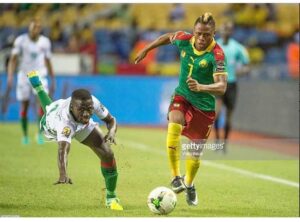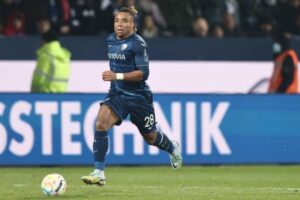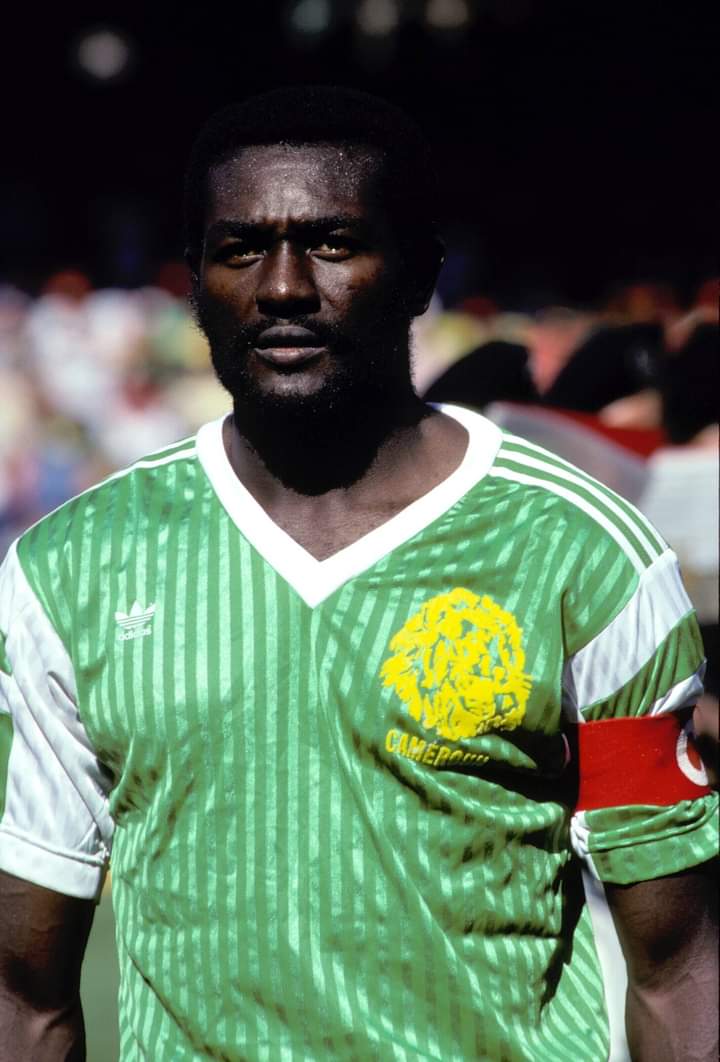Ask any young Cameroonian football fan which anglophone player he or she knows that (has) play(ed) for the Cameroon national football team, and what you’ll quickly get as response is either Fai Collins, Enoh Eyong Tarkang, Clinton Njie, Pius Ndiefi or better still Tataw Stephen and Ndip Akeng Victor, at least for those who have developed some interest for the national team.
But how many are aware that the first time an anglophone was called up to the national team and played a 90-minute match was in 1981 and the player in question was Epie Zams who played for PWD of Kumba and Union Sportive of Douala?
Anglophones and the national team; How and When?
The romance between anglophones and the national team dates back to the 1990 World Cup featuring Tataw Stephen and Ndip Akem Victor. Together with the other lions, they sent hot soccer waves rippling across the World.
However, footballers from the English speaking part of the country began integrating the national team as early as the 1960s.
In 1961, Fidelis Ebai was called up from Limbe to the national team.
In 1968, five dreaded players were drafted in from Prisons of Buea. Amongst them was Macaulay Che and Stephen Ndiefi, the father of Pius and Macdonald Ndiefi. Yes, you read me well.
Pius Ndiefi’s father alias “404” was a swift winger who played for Cambank and Prisons both of Buea. He was amongst the early anglophones to play in the national team.
In his first national team outing, “404” played a World Cup preliminary match against Nigeria in 1968. Among his team mates were Tokoto Jean Pierre, Manga Onguene, Mukoko Confiance and the legendary Mbappé Leppé. In fact, Mukoko Confiance (RIP) once confessed to veteran sports caster Njomo Kevin that in that qualifier against Nigeria, they (teammates) found it very difficult to keep pace with the speed of Stephen Ndiefi.
Unfortunately, Nigeria defeated Cameroon in that round of the competition which saw its second round at Stade d’Akwa, what is today known as the Stade Mbappé Lepé.
Also note that it was a black day for Mbappe Lepé because that match brutally ended his career after he lost a penalty which could have taken Cameroon to the next stage of the competition.
Another anglophone cult hero in the game was Joseph Ewunkem. He was fantastic right back and thrilled Cameroonians with his impeccable football. But the best he could get was playing for the military national football team alongside famous names like Albert Roger Milla, Thomas Nkono, Fouda Batchot etc. He played the 1975 military World Cup with Cameroon. Grand Joe, as he was affectionately called, would be remembered for catching the ball in the 1968 Cameroon cup final against Oryx of Douala of the famous Samuel Mbappé Lepé. Ewunkem felt cheated.
Anglophones blossomed more in the junior national teams!
The preponderance of anglophones in the national team was in the junior category.
In 1981 at the FIFA junior World cup in Australia, defense rock, Nji Sunday, held Diego Armando Maradona to muscle breaking point.
Maradona changed positions several times during the game but Nji Sunday consistently pinned him down with his breathtaking defending.
An enviable list of outstanding anglophone players covered the period between 1981 and 1995 with players like Ndiefi McDonald, Simo Augustine together with other team mates such Geremi Njitap and Pierre Wome Nlend who captured the 1995 Junior African Nations Cup trophy in Nigeria.

Simon Augustine as a trainer
Despite the plethora of English speaking players in the junior National team, few graduated to the senior category. Some players of the senior category could not break through.
Many English speaking players in the senior category were drafted but few featured in the team proper.
Deadly striker, Mboh Mafiamba of PWD Bamenda and Kumba, despite his numerous hattricks could not find a place in the national team. In fact, with his performance, supporters of Meme Works could hardly understand why he was never called up to the national team, especially after his memorable thrill with Canon Sportive of Yaounde during which he punished goalkeeper Jacques Songo’o with three goal in 15 minutes in a league match played in Yaounde.
Veteran sports journalist Njomo Kevin in an interview with this reporter said opponents always tore Mafiamba’s jersey to avoid him dazzling through them.
Some could not break through!
Moliki of PWD of Bamenda was a midfielder of exceptional class but had no national team football, except for once that he was selected.
Nlend Simon who managed a breakthrough stayed there for six years but was reserve goalkeeper throughout.
There were some who worked extremely hard and luck also shone on them.
Mokoko Joseph was a delight to watch with his mesmerizing dribbling qualities. He was a decent ball joggler who earned the respect of team mates such as Kana Biyick but he never had the opportunity to be called up to the senior team.
Similarly, Chia Simon in Nkono prototype ended up only in the junior team.
David Kassara was “beastly” with his unrivalled creativity, but he too could break the deadlock.
What happened between the 1970s and 1980s
From the late 70s a few English speaking players enjoyed a romance with the national team. Some of them were Moliki Fidelis of PWD Bamenda, Nlend Simon of Racing Bafoussam, Epie Nzams and Kang Wilson of PWD Kumba, Kassara and Nana Njiki of Cammark of Bamenda, Ndip Akem Victor and Tataw Stephen of Cammark of Kumba and Ntamark Charles of Canon Sportive of Yaounde, just to name a few
In 1981/82, Epie Nzams became the first anglophone to play a CAF/FIFA match.
In 1988, Ndip Akem Victor and Tataw Stephen became the first anglophones to win the Africa Cup of Nations.
Throwback to World Cup 1990 when Cameroon's legendary defender Victor Ndip Akem promised Argentina's Diego Maradona death if he tried any dribbling shenanigans.
In Ndips words "If you cross our line, I will kill you" 🤣
Back then playing for 🇨🇲 was a matter of life & death. pic.twitter.com/7HVwkmBKkl
— NJIE ENOW: The Razzmatazz (@NjieEnow) April 10, 2023
Two years later, that is at the 1990 FIFA World Cup, they still became the first anglophones to play a FIFA world Cup and first and only anglophones to reach the 1/4 finals of the tournament. This inspired many young anglophone footballers.
Their exploits with the national team opened the doors for many.
Then came in the Roland Ntokos, Essa Pius (fantastic defender), Njang Sunday, Augustine Simo and Ndiefi Pius.
The Ndiefis and the national football team
At the preliminary stage of this article, we talked much about the exploits of Stephen Ndiefi, the father of Pius and Macdonald Ndiefi. Don’t forget that we also mentioned that Ndiefi’s father was a phenomenal winger who played for the national team and that he was technically gifted and had tonnes of speed that earned him the name “404”. His first footballer son was Pius Ndiefi (current assistant coach of the Intermediate lions) and the second McDonald Ndiefi.

Pius Ndiefi
Yes! MacDonald Ndiefi was a top top striker with Ekata Farmers from where he was drafted into the junior national team. He was the titular 9 shirt of the junior national team that won the 1995 AFCON.
Note that there were players in the team like Geremi Sorel Njitap, Tchango, Simo Augustine, Wome Nlend and a host of other popular contemporary names in the soccer business.
Unfortunately, MacDonald could not break through the senior squad but his brother, Ndiefi Pius, did. Pius won the 2000 and 2002 AFCONS and played a key role in Cameroon’s 2003 FIFA Confederations Cup runners up finish. He is the most decorated anglophone (national team) footballer of all time.
THE 2000s!
The mid 2000s saw anglophones struggle to break through the senior national team. Enow Eyong Tarkang finally made it and is hugely credited for being one of the most dedicated and responsible anglophone Cameroonian footballers.
Apart from Stephen Tataw, Enoh Eyong Tarkang is the only anglophone to have worn the armband of the national team (Vice captain).

Njie Clinton Mua in action during AFCON 2019
Njie Clinton, Fai Collins Ngoran, Ndip Tambe Robert and George Bokwe helped Cameroon win the 2017 Africa Cup of Nations in Gabon.

Fai Collins Ngoran
While Pierre Kunde Malong and Fai Collins are still in the team, the other three are being snubbed for under performing at club level.

Kunde Malong in action for Bochum
Denis Ndassi, Bong Lionel and Thomas Etta Bawak, have also been called up once (for major pre tournament revision) but have all failed to break through the final squad lists.
There is no doubt that the English speaking part of Cameroon is greatly endowed with talented footballers but over the years the culture of football in this part of the country has been overwhelmingly questioned.
Most anglophones don’t invest in football and majority don’t encourage their children to play football. The result is visible in football training centres (academies). Take for example the Njalla Sports Acadamy which is arguably the best west of the Moungo. Four years ago, over 80% of the trainees there were francophones, whereas statistics have shown that anglophones who take football very seriously at the infant stage have an 87% chance of emerging. (Katche 2017).
With the proliferation of football academies in the region, as well as the increasing interest by young footballers, it is hoped that things will change fast. After all, “there is space for everyone in the national team!”.
Copyright©2023 kick442.com-Cameroon
All rights reserved. This material and any other digital content on this platform may not be reproduced, published, broadcast, written, or distributed in full or in part, without written permission from our management.
This site is not responsible for the content displayed by external sites
